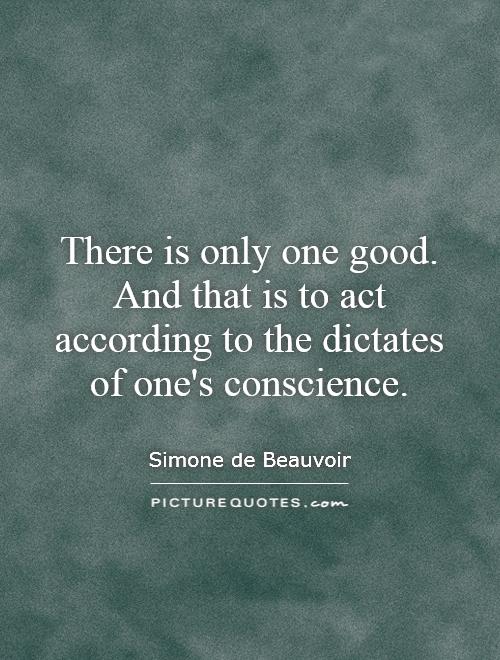There is only one good. And that is to act according to the dictates of one's conscience

There is only one good. And that is to act according to the dictates of one's conscience
Simone de Beauvoir, a prominent French existentialist philosopher and feminist thinker, believed in the importance of following one's conscience in order to lead a fulfilling and authentic life. In her work, she emphasized the idea that there is only one true good, and that is to act in accordance with one's own moral compass.De Beauvoir's philosophy is rooted in the existentialist belief that individuals are responsible for creating their own meaning and values in a world that is inherently devoid of inherent meaning. This means that each person must make choices based on their own beliefs and principles, rather than relying on external sources of authority or societal norms. For de Beauvoir, this meant listening to one's conscience and acting in a way that aligns with one's own sense of right and wrong.
In her seminal work, "The Ethics of Ambiguity," de Beauvoir argues that individuals must take responsibility for their actions and decisions, even in the face of uncertainty and ambiguity. She rejects the idea of a universal moral code or absolute truth, instead advocating for a more subjective and personal approach to ethics. According to de Beauvoir, the only way to live authentically is to listen to one's conscience and act in a way that is true to oneself.
De Beauvoir's emphasis on the importance of conscience can be seen in her own life and work. As a feminist thinker, she challenged traditional gender roles and societal expectations, advocating for women's rights and autonomy. She believed that individuals must resist oppressive systems and structures in order to live authentically and ethically. By following one's conscience and standing up for what is right, de Beauvoir believed that individuals could create a more just and equitable society.












 Friendship Quotes
Friendship Quotes Love Quotes
Love Quotes Life Quotes
Life Quotes Funny Quotes
Funny Quotes Motivational Quotes
Motivational Quotes Inspirational Quotes
Inspirational Quotes